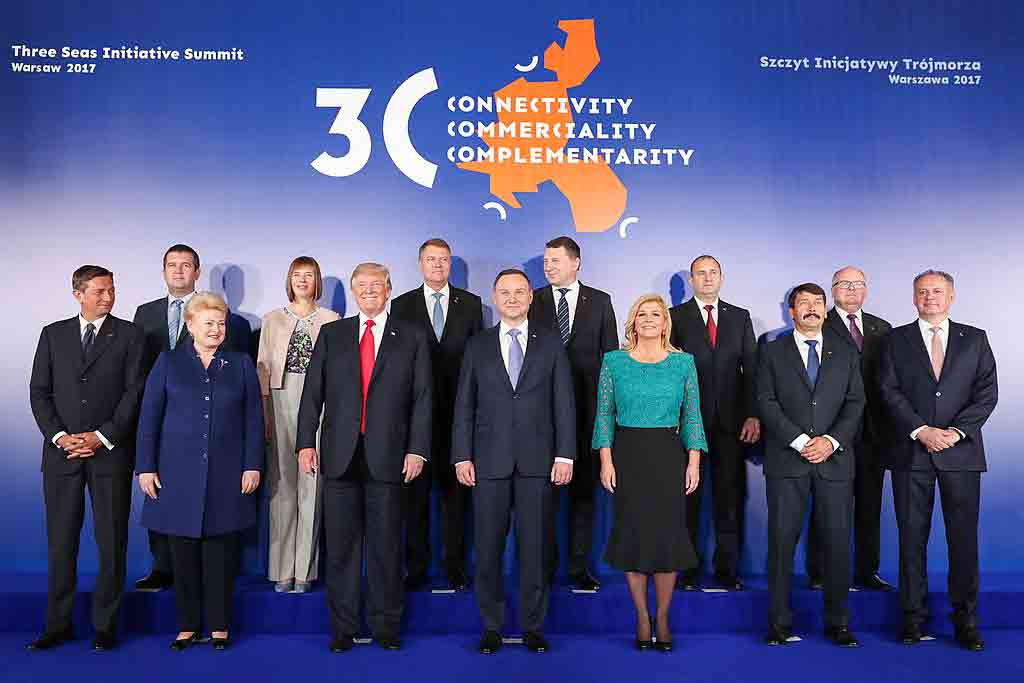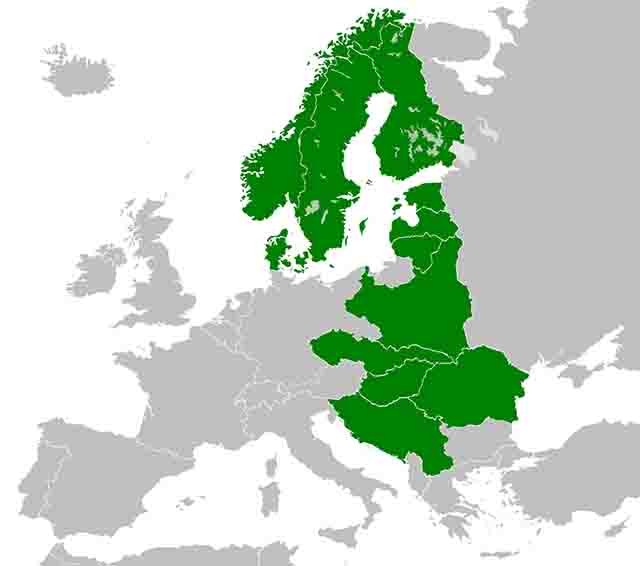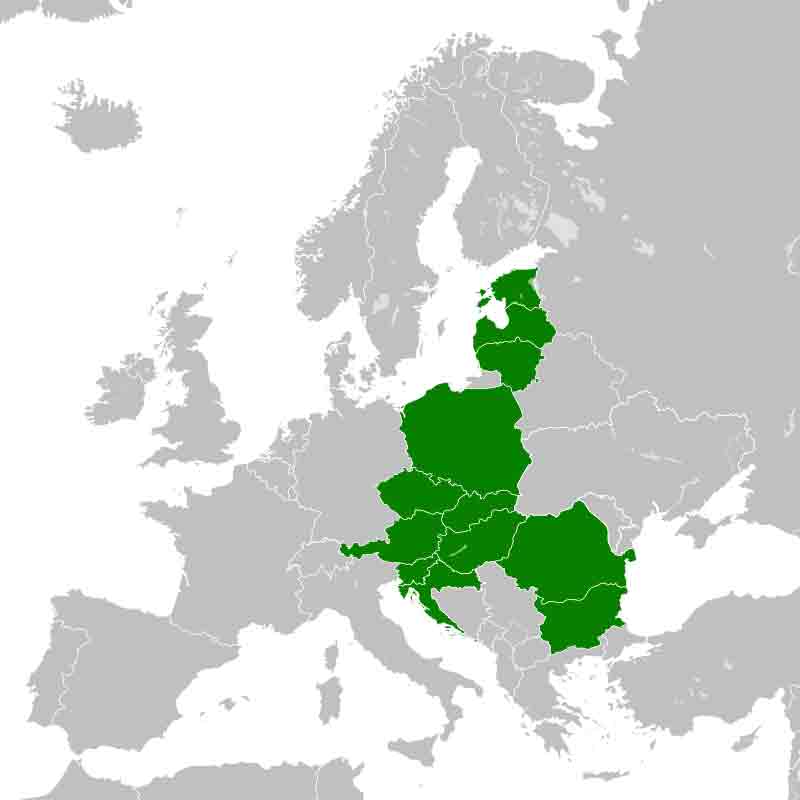Although most people still haven’t heard of it, the Three Seas Initiative is the most significant political and economic policy initiative to emerge in Central and Eastern Europe since the enlargement of the EU and NATO. [6] It's an international economic and political initiative that currently brings together twelve countries of the European Union located between the Baltic, Black, and Adriatic seas. The Three Seas group includes Central European countries with a total population of over 110 million: Austria, Bulgaria, Croatia, the Czech Republic, Estonia, Lithuania, Latvia, Poland, Romania, Slovakia, Slovenia, and Hungary. In addition, Ukraine and Moldova have already expressed their interest in the project quite recently (January 2021), and the United States and Germany are "observers."

The countries of the Three Seas Initiative (Source: Wikipedia)
The initiative was announced by Presidents Andrzej Duda from Poland and Kolinda Grabar-Kitarović from Croatia, at a meeting - and this is significant - in New York in 2015 — it has thus been in existence for almost 6 years. Subsequently, on August 25-26, 2016, a formal declaration was adopted at the first summit in Dubrovnik, Croatia, which outlined the goals of the cooperation. It is to take place in the fields of energy, transport, digital communication and the broadly understood trade. Central and Eastern Europe is to become more secure and more competitive thanks to this initiative.
The member countries which - in most cases - from the end of World War II remained within the Soviet bloc, i.e. behind the so called Iron Curtain, would catch up with their Western partners in the European Union in terms of the economic development. The Initiative is therefore thought to contribute to the overall strengthening of the European Union as a whole. [4]
The Three Seas is not Intermarium
The Three Seas Initiative should not be confused with another concept that was presented during the interwar period by, among others, geographers of such a stature as Eugeniusz Romer, namely the " Intermarium ". At that time, Poland, as a country located on the East European Plain, stretching from the Baltic Sea to the Black Sea basin, wanted to play a leading role in integrating the countries and nations of the region, largely in order to counter the destructive influence of the Third Reich and the Soviet Union. It was supposed to be an alternative to the growing power of these totalitarian systems: the so-called Third Europe. It was also a great and romantic dream of Polish emigration, referring to the glory days of the Polish-Lithuanian Commonwealth, a dream that, in various forms, has survived until today, and even experienced its renaissance in the times of the Third Republic, in accordance with the typically Polish messianism and sense of uniqueness.
The concept of the Intermarium was a purely Polish initiative, associated with Józef Piłsudski and his political camp, or Sanacja, based on the vision of Poland "from sea to sea" and its leading role among the nations of Central Europe. As a result, it was facing - to put it mildly - skepticism in other countries of the region. It is often perceived as a manifestation of Poland's former superpower ambitions.
Meanwhile, in reality, Poland is today merely a country on the Baltic Sea, located in the Central European Plain, far from the stature of a "superpower" or any access to the River Dnieper and the Black Sea basin, so a simple geopolitical analysis should explain that the dreams entertained during the Second Polish Republic lost their raison d'être. Today's Central Europe is a collection of independent, rather small states, some of which are members of the European Union, where each of them has its own state priorities and its historically-conditioned views on the geopolitical situation of the region, and has its own strategic problems.
"If the national interests of all participating states were summed up, it would be understandable that the raisons d'état of the individual countries are mutually exclusive or at least not convergent." [2] The Three Seas must therefore necessarily be devoid of a political element in the sense of the preference of one member state over another. It has to be a true economic partnership not necessarily requiring any common political vision.
One characteristic is common to all these countries, however: none of them is able to oppose the superpower aspirations of other, larger units on their own, so they must all seek alliances that are favorable to them, which would allow for relatively smooth and uninterrupted economic growth and, consequently, their increase in strategic power.
Although it is not the right time today to revive the proposals of the Intermarium, the Three Seas still has a chance, and also advantages that were lacking in the offer addressed to the countries of this region in the past: first of all, the support of a still very strong superpower.
The true nature of the Three Seas
Contrary to appearances, the real initiator and originator of the new Three Seas idea was not Poland or Croatia, but the United States. According to the well-known Polish geopolitician, Leszek Sykulski, the Three Seas Initiative is "an instrument of American policy aimed at separating Germany and Russia, and constituting an element of geopolitical pressure on Russia itself" [1]. There is therefore some hope that, as an instrument of American policy, it has some chance of success this time.

The Three Seas Initiative Summit, Warsaw 2017
(Source: Krzysztof Sitkowski, CC BY-SA 4.0, via Wikimedia Commons)
The political dimensions of this initiative are inextricably linked with the economic ones. In the words of the now former president of Croatia, Kolinda Grabar-Kitarović, "the main goal of the Three Seas Initiative is to ensure the coherence of the network of connections and competitiveness." [4] Simply put, the economic development and closer digital and logistic integration of the region are supposed to allow for the acceleration of economic growth, which in turn, by tightening cooperation in the region, can only strengthen the importance of the member states in the international arena and raise the standard of living of their inhabitants.
Therefore, the benefits of the Three Seas Initiative for the countries of the region are obvious — after all, no one can doubt that all member states could benefit a lot from increasing mutual cooperation, strengthening economic ties, improving trade routes and telecommunications connections.
Here, however, we would like to focus on why, in the current geopolitical situation, investments in the Three Seas Initiative are not only beneficial, but also strategically crucial for America itself, and why, therefore, America should support and invest much more in the Three Seas Initiative than it has done so far - but, let's add, invest wisely.
The Three Seas as an Economic Initiative
The Three Seas is primarily about the economy, energy, digitization and transport, and the profits that may result from the involvement in this project can accrue not only to the benefit of each of its members, but also to the trade partners of the member states, including - and perhaps even especially so - the United States and the European Union.
While the United States is facing the challenge of Russian and Chinese economic and geopolitical competition both in Europe and internationally, the Three Seas Initiative provides an opportunity to strengthen the economies of close US allies in Central and Eastern Europe and reduce their economic, and therefore political, dependence on influence of Moscow and Beijing.
In the field of energy, the Initiative will seek to use new Liquified Natural Gas (LNG) terminals in Świnoujście, Poland, Klaipeda, Lithuania, and Krk, Croatia. All three terminals have already been built and are to be ultimately connected by a North-South transmission pipeline, which is to provide energy security to all countries in the region.

LNG terminal in Świnoujście (Photo: Marcin Aleksander, Picasa)
As for the proposed transport projects, these are expected to include North-South motorway links, support for new and existing railways between the countries in the region, and plans to complete the water corridor joining the Danube, Oder and Elbe rivers.
Finally, as far as digital and telecommunications interconnection is concerned, the projects include platforms for improved digital trade, research collaboration and a plan for a "Digital Three Seas Superhighway" that will connect the region via optical fiber. Ultimately, the cooperation is also to include technologies related to the implementation of 5G.
In total, the Croatian report from 2016 shows that over 150 large infrastructure projects can be implemented in this part of Europe, with a total value estimated at 50 billion euros.
Via Carpatia, Via Baltica, Baltic Pipe and the construction of another LNG terminal in Świnoujście, connecting the entire Central Europe with express routes and rail tracks, i.e. Rail Baltica, are just some examples of what the twelve member states could conceivably do.
Benefits for the USA
The United States does not support the Three Seas Initiative solely for humanitarian and liberty reasons. The slogan of the fight "for your freedom and ours" - but without reciprocity - is a typical Polish ailment and too many Poles have already lost their lives because of it. Americans, on the other hand, are pragmatists and therefore support the Three Seas Initiative. For them, it's just great business and an opportunity to strengthen the alliances they will need in the turbulent times ahead.
The United States has a chance to strengthen the economies of its key allies and reduce the region's dependence on Russian energy imports. This is strategically important, both politically and commercially, as the US is now a major energy exporter. "We have enormous energy resources, at the moment we are energy exporters, so no matter when you need it, just give us a call," said President Trump at the Initiative summit in Warsaw in 2017. [4] The Three Seas countries need to buy energy from somewhere, so why not from the US?
The second factor motivating Americans to invest in the Three Seas Initiative is the prospect of creating sales markets for other American products. Among them, the most important strategic purchases are weapons systems. According to President Trump, "the US has the best technology in this field" [4]. Military equipment exports are a very important part of the US economy, which is why Trump also said, "When you buy military equipment, I hope you only think of the United States." [4]
Thirdly, the Three Seas countries are primarily a reservoir of highly qualified, skilled and educated human resources. One of the rather surprising legacies of the communist era in the Central and Eastern Europe have been exceptionally well-functioning education systems. Although they have been "improved" in various ways since the regaining of independence by the countries of the region, they still function - I would say - better than, for example, in the United States. As a result, the region is saturated with highly qualified specialists who are highly valued both in the USA and in Western Europe. They can provide an excellent intellectual background and a source of much-needed innovation for the entire, so-called, West.
What about Germany?
Initially, the Three Seas Initiative aroused some skepticism from the European Union and other Western European neighbors as strong political support from the United States troubled Brussels that the Initiative could be used to undermine the EU's authority or position in the region.
Later, however, it seems that these doubts have been dispelled and the European Union seems to be fully committed, as demonstrated by the participation in the 2018 Bucharest summit by both the President of the European Commission, Jean-Claude Juncker, and the German Minister of Foreign Affairs, Heiko Maas.
From the Polish perspective, the situation in Europe today is much different than in the interwar period, when the Intermarium concept was promoted. This may require a change in certain orientations and views over what constitutes an opportunity versus a real threat. Today Germany is an ally in NATO and the largest trade partner (28% of all Polish exports), not an attacker.
"Convincing the Germans to this initiative can be a key factor in the success of the entire initiative, as well as individual initiatives within its framework." [2] After all, nothing can be achieved in today's Europe without the support and commitment of the continent's most powerful economy.
In summary, the Three Seas could help both Poland and other countries in the region to build or increase their power, strengthen and better integrate the European Union, and give America a solid political base as well as sales markets and economic opportunities, along with a vast intellectual potential. It's hard to imagine a region better suited for American investment.









